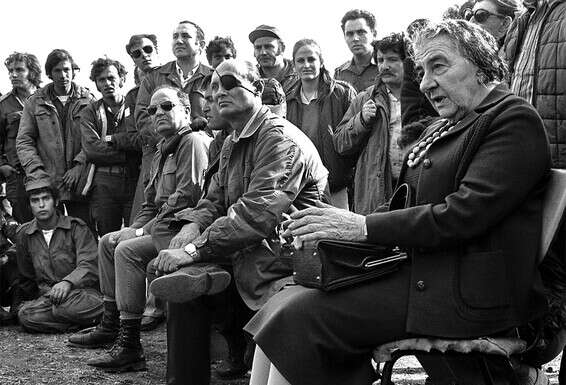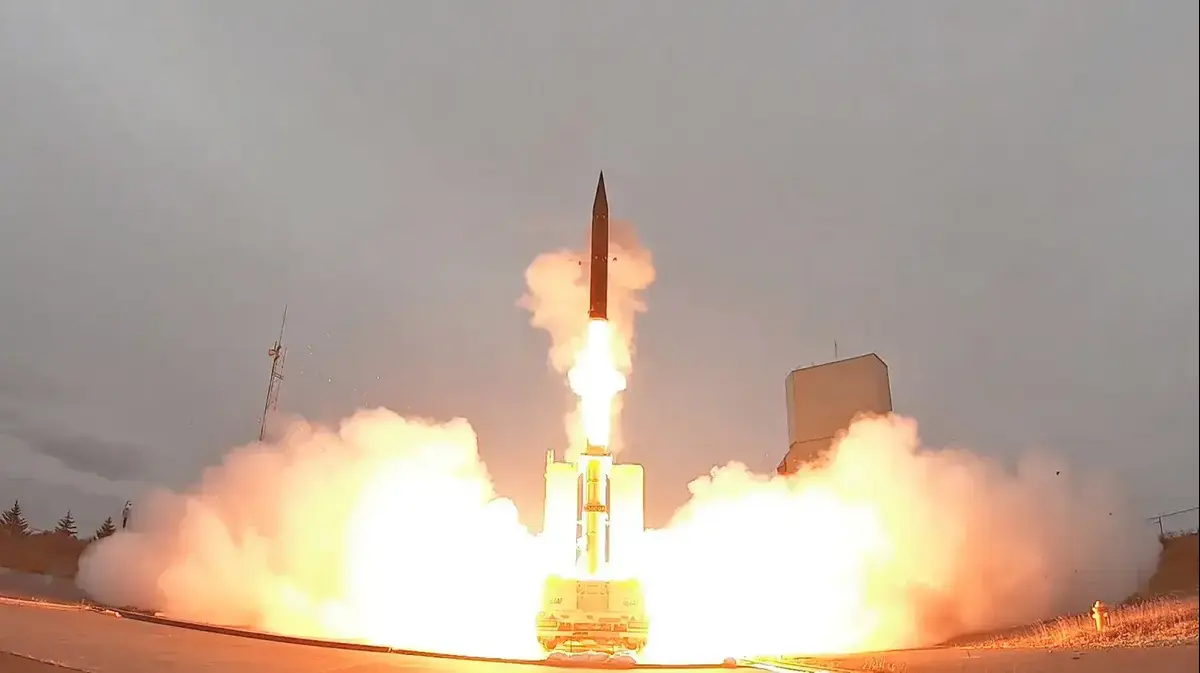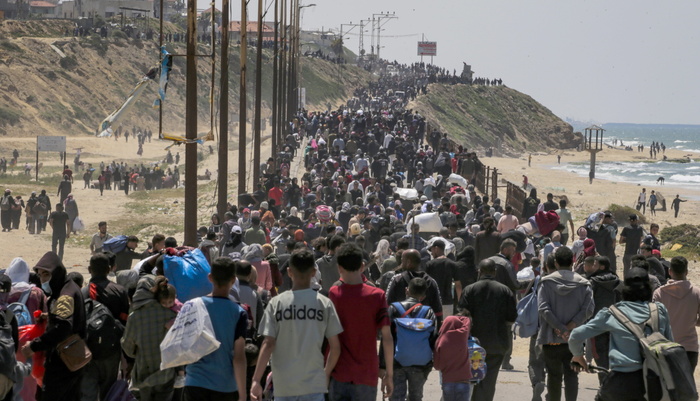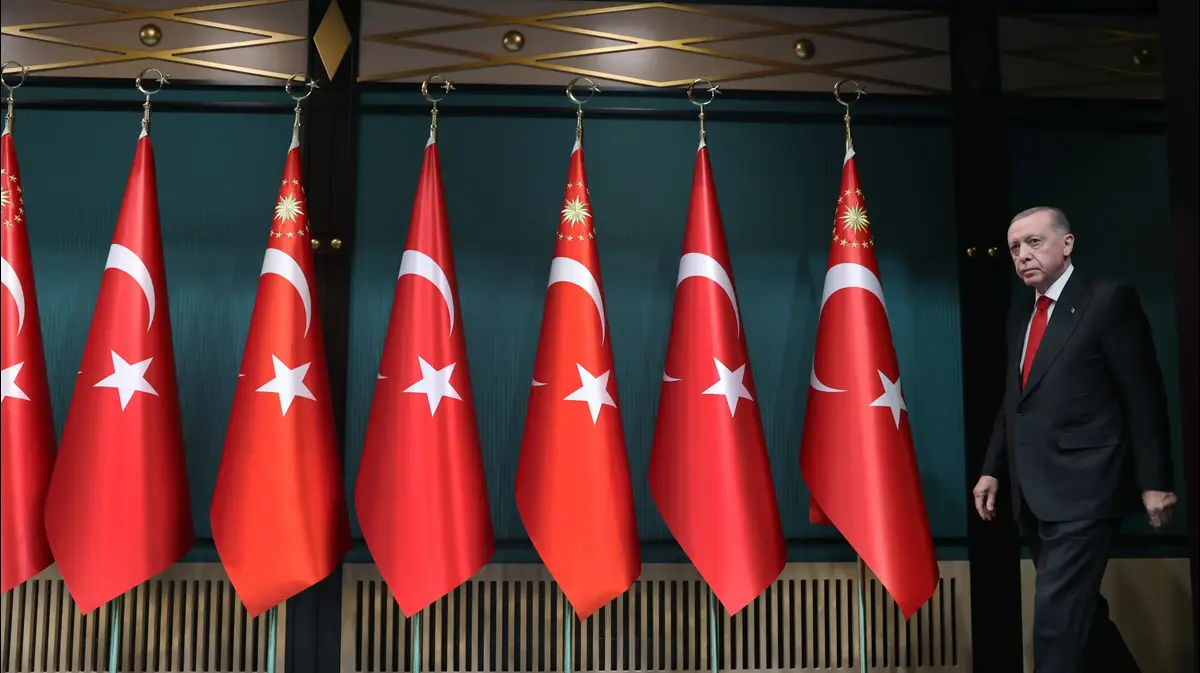The officer, who was recruited by the Armed Forces and transferred to the Mossad, passed critical information • On the seventh day of the war he provided "golden knowledge" that the Egyptians were preparing to attack
Crossing the canal in the Yom Kippur War
Photo:
Ron Ilan / GPO
On
Friday afternoon,
October 12, 1973, at 2:30 PM, Prime Minister Golda Meir convened the "Kitchen", the forum that made the decisions on military-political issues.
The Yom Kippur War entered its seventh day, and at the hearing a fateful question was posed: whether to cross the Suez Canal the next night, on Saturday night.
After the IDF managed to repel the Syrian army from the Golan Heights and score beyond the border line, the center of gravity of the war was shifted south. These were decisive moments on the Egyptian front. The South, former Chief of Staff Haim Bar-Lev, and Air Force Commander Major General Bnei Peled.
The descriptions presented in the discussion were difficult.
The chief of staff, Lt. Col. David Elazar (Dado), expressed concern about an indecisive attrition, which would increase the erosion of forces, and suggested requesting a ceasefire.
Major General Peled said that the Air Force had lost a large number of aircraft and that it was approaching the red line, which was stationed on 220 aircraft - and once it reached it, it would no longer be able to assist the ground forces.
The defense establishment expected for many days that the Egyptian Armored Divisions 4 and 21, deployed west of the canal, would set out eastward;
Staying in place has reduced the chances of success of the success.
Despite this, Bar-Lev and Peled expressed their opinion in favor of the action.
Even before the deputy chief of staff, Major General Israel Tal (Talik), had time to sum things up, the head of the Mossad was called Zamir for an urgent phone call. His chief of staff, Freddie Eini, and the head of the institute's technology department, Yoel Salomon, were on the line.
When Zamir returned to the room, he said he had "golden knowledge" that the Egyptian army intended to land parachuted forces on the crossing line within a day or two.
The operational conclusion was that the armored divisions would follow in their footsteps.
"I understand that Zvika has finished the discussion for us," Golda said, and the tide fell: the success of the canal was delayed;
The IDF turns to containment, lurks for the Egyptian forces, contains the attack - and after that it will succeed.
The existence of the news item has been published in recent years, but what is less known is who was behind it: an Egyptian army officer, who was recruited as a spy and passed on inside information to the Israeli intelligence community.
Even today, 47 years after the war, the censor is afraid to divulge details about him, and does not approve of publishing even the nickname he received.
The information provided by the Egyptian source eventually led to a revolution in hostilities;
The IDF, which had failed on the southern front until that day and did not achieve anything on the ground, managed to take the initiative into its own hands.
"After his robbery came out of the decisive hearing, he went down to the pit, and I remember wiping the sweat from his forehead with his finger and saying, 'Now I know what to do. We will wait for them and suck them, and after that we will cross the canal,'" The Intelligence Division, which then served as assistant to the Operations Research Division.
Unlike the famous Egyptian agent "The Angel", after all he is Ashraf Marwan (later also known to the public as "Babylon", although this was not his official nickname), the work of the "Golden Source" was forgotten and did not receive media and public resonance.
"Everyone is talking about Marwan, and no one is talking about the 'source of gold,' who should sit next to him on the best spy throne," says Moshe Shevardi, a Yom Kippur War researcher.
"When the money came, before the war broke out and at the most critical moment during it, he passed on two gold news items, not one."
The fateful news he conveyed on October 12 was not the first, as Shevardi testifies.
Two weeks earlier, on September 30, the source informed its operatives that Egypt and Syria were about to launch a combined offensive against Israel, but the top security officials did not handle the information properly.
"It was the ultimate news item," says retired Col. Hagai Mann, 83, who was then the Northern Command's intelligence officer.
***
The Egyptian officer was recruited as a spy by retired Brigadier General LeBren. "I created it and created it," reveals LeBron, now 88. "When I first met him, I was not sure he would agree to work for Israel, because of his status in the army.
I just wanted him to be my friend, so I could help him understand the Egyptian side.
"We told ourselves that we in Modi'in evaluate assessments and draw conclusions about the Arabs, but in the end we are Israelis, with a mental orientation of a Western country. I thought it would help me understand the mindset and way of thinking through Egyptian eyes, and give his point of view in all kinds of situations.
"I did some exercise for him, which I will not expand on, and to my delight, he volunteered to be a source. I operated it for several years. The relationship between us was conducted by means similar to those used by the late Eli Cohen in Syria a decade earlier.
I could send him messages, and he would send me material. "
In 1970, Bern and the spy were forced to separate because the Mossad demanded that the Egyptian be held accountable.
"Within the Israeli intelligence community, there are clear boundaries," LeBran explains.
The GSS works within our territory, the Armed Forces meets with its agents at border crossings, and the Mossad works with agents abroad.
"I could operate the 'Golden Source' only with the help of the Mossad. Because of its role, it was not possible to bring it to meetings at border crossings, and the connection between us was conducted through abroad.
I have run it from many places around the world.
"In 1970, after I started meeting with him quite regularly, with the help of the Mossad, they said, 'Damn it, what is it? It can't be that a security guard is constantly assisting us in our services,' and asked that the source go to their care."
Are you fighting to keep it with you?
"Mossad chief Zvika Zamir is a good friend of mine, he was even my son's godfather. I had no choice but to give up, and I must admit that the Mossad's claims were justified. I last met with him in 1970 in Europe, and we have not been in contact since. But he He had already been recruited for Israel, so it was easy for him to continue working with Mossad personnel.
"I received a certificate of appreciation from the IDF in advance, and I was released.
I put this story in history.
The great thing about the institution was that they transferred a more advanced walkie-talkie to it.
Thanks to this, he was able to convey news to them in real time, like the two important news he provided in '73, before and during the war. "
When the source transferred the two gold pieces of information to the institution and you received them in the pit, did you know that it was him?
"No. Once he moved to the institution, he got all sorts of nicknames from them, different from the one I gave him. Sometimes the agent is given more than one nickname, to keep him. If he gives military material, he is called X. If he passes material on the Egyptian top, His name is Y. At that time I did not know who passed on the news, I only found out a few years later. "
How do you reward such an important source?
"Occasionally you look for ways to give him a bohta, also depending on the quality of the information he provides. I can responsibly say that this source was worth every penny, and I imagine that knowing gold on Yom Kippur he did not come out empty-handed. At that time we had three agents from above. "Ashraf Marwan, he is, and another one we will not talk about."
Throughout its years of operation, was there a stage where you feared it was going to "burn out"?
That the Egyptians suspect him?
"I do not know that he was at any risk, certainly not in the years I was in contact with him, nor when he worked with the Mossad. It is rumored that he died in the Egyptian attack on October 14, 1973, but it was not true. He died under natural circumstances, several years "After the war. The deputy head of the Mossad informed me of his death. I felt I had lost a friend."
As far as you know, did any of his associates know about his cooperation with Israel?
"I don't think so. I guess he took that secret with him to the grave."
***
Quite a
few signs
and clues were presented to Israeli intelligence regarding an attack to be launched by Egypt and Syria in October 1973. One of them arrived from the Egyptian officer's walkie-talkie on the evening of Sunday, September 30, six days before the outbreak of war.
"We knew that the next day a big exercise was going to open in the Egyptian army, 'Tahrir 41,'" LeBren says.
"But his knowledge claimed that at the end of the maneuver there would be a real success, which would in fact turn into a war."
At 4 a.m., Monday, October 1, Hagai Mann was sitting at his home in Kibbutz Beit Hashita and conducting a telephone briefing with an intelligence officer in the Golan Heights sector.
"The caller intervened and said that I had an urgent call from the General Staff.
On the line was the head of Branch 5 of the Armed Forces (who was in charge of the arenas of Syria, Lebanon and Iraq; A.O.), Aviezer Yaari, who told me: First, attackers, and the Syrians join them.
Raise command '.
"The panic was great. The commander-in-chief, Yitzhak Hofi, was just in the recruitment and equipping exercise of the 179th Armored Brigade. I immediately turned to him and gave him the news. I went to the command headquarters in Nazareth.
"I called the intelligence officer of the Southern Command, David Gedalia, but a sleepy duty officer answered me that he was sleeping at home, and so was his deputy. At 7 a.m., after daylight and nothing happened, I was called by the head of the research department at the Armed Forces, Col. Arie Shalev. , And said to me in a very angry tone: 'What's the panic you made tonight in Northern Command?'
"Before I could answer that I had received the news from his research department, he said: 'We will make an inquiry' - and hung up. That same morning I was summoned for an interview with him the next day."
How did you explain to yourself what happened?
After all, the knowledge was disrupted until it reached you.
"The warning of the war reached the Armed Forces on Sunday evening, and I received it very late.
I was also worried about this, since we identified extensive activities on the Syrian side, and even before the news reached me, we decided to massively strengthen the array of observers in the Golan Heights. "
***
On Monday, October 2, at 14:00, Mann showed up for questioning at Shalev's office in the Tel Aviv area.
Yaari also participated in the conversation.
Shalev asked me, 'Did no one tell you it was related to the Egyptian exercise?'
I said no, in the end, I was not reprimanded.
"Before I left, I told both of them that I had signs that Syria was preparing for an attack on Israel. There were at least ten of them. Hundreds of tanks were accumulated, the forces were doubled, and an air-to-air missile array was set up."
And what did he answer you?
"'We have other signs.'"
Did you know that behind the news is the same "source of gold" that works for Israel?
"Absolutely not. I thought it was Marwan. It was only many years later that I found out that we had another source in Egypt, and very recently I learned that he was the one who provided the information."
"The Armed Forces did not underestimate the knowledge of the Egyptian source and did not ignore it," LeBren says. "The situation was quite problematic.
The night after receiving the news, the Southern Command checked the condition of the Egyptian Air Force, and saw that everything was quiet.
At that moment, this knowledge was just one of many.
Only in retrospect does such knowledge become 'something-something'. "
Less than a week later, the Israeli concept collapsed, and war broke out on Yom Kippur.
"I was disappointed that I was right along the way," Mann says.
"To this day I ask myself how I may have seen things, and the others have ignored or not seen. It has haunted me for 47 years."
***
The golden knowledge conveyed by the Egyptian spy on October 12 caused a change in thinking on the Israeli side, and in retrospect it seemed to play a significant part in preventing discrimination on the southern front: it torpedoed the choice of other alternatives - a ceasefire request or early success of the canal against many significant enemy forces.
"His knowledge did not speak of the passage of the two Egyptian divisions to the east bank of the canal, but of the parachuting forces, which were to land in the area of the crossing line, in Bir Gafgafa and Mitla," says LeBren.
"The clear implication, which every senior military man knows, is that only the armored forces can join in to help these forces."
Two days later, on the morning of October 14, the Egyptian army launched a planned offensive in six main areas, using armored forces, infantry, artillery, aerial bombardment and armed raids by commando fighters. Contrary to what the Gold Source reported, there were no paratroopers.
The IDF was prepared for the arrival of the Egyptians and repulsed them in all sectors, inflicting heavy casualties on them. In retrospect, it became clear that President Sadat had pushed for the operation, partly due to pressure from Syria, contrary to the views of senior military officials.
It was the first Israeli victory in the battles at Sinai, and it also marked the beginning of the upheaval on the entire southern front: the Egyptians' move to a mobile offensive left their air defense behind, thus exposing the Egyptians on the front line to air strikes.
The Egyptians initially admitted that one hundred of their tanks had been destroyed that day, but later the army commander, General Saad a-Shazli, admitted that it was 250 vessels.
The next night, between October 15 and 16, the IDF set out to cross the canal.
Since that day, the reality on the battlefield has changed: Israel has begun to attack and initiate, and Egypt has gone on the defensive.
Our forces stormed the West Bank and besieged the Third Army, while the Egyptian army did not attack again until the end of the war.
Some people doubt the importance of knowing that the forgotten spy passed on.
Military researcher and historian Brigadier General (Res.) Danny Asher (76) served during the war as the intelligence officer of the 16th Brigade (Jerusalem Brigade), after serving as head of the Egypt Division in the Southern Command. Many years later he published the book "Breaking the Conception".
"Militarily, the information was incorrect," Asher claims.
"We wanted the Egyptian army to move its tanks and break into the spaces, because in armored battles we are better than them, and we have the Air Force bombing them. When the 'Golden Knowledge' arrived, it actually said: 'Here, what you were waiting for happens.' Made a move, but this was not the attack described, and no forces fell in Mitla and Jedi.The estimate that the two Egyptian divisions would move east did not materialize, as only two divisions of these divisions participated in the attack.
"In retrospect, I know that the Egyptians planned to do something on October 13. We were deep inside the enclave in Syria, we reached up to 40 km from Damascus and fired cannons at the suburbs of Damascus.
The Syrians shouted 'Gevald' and demanded that Sadat make a move that would force us to move forces south.
On the 14th of the month, Egypt launched a sporadic, stuttering attack, without much force.
"Perhaps our decision-makers understood what they wanted to understand, and saw a mountain shadow as mountains."
LeBren disagrees.
"Some underestimated the strength of the Egyptian offensive. The Egyptian forces included the entire 21st Division, and at least one brigade from the 4th Division, and another mechanized brigade. Three portable anti-aircraft missile batteries, then the most advanced in Arsenal at the time, were transferred east of the canal.
Why transfer all these forces, if not to continue the attack?
"It is true that paratroopers were not stationed in the Straits of the canal, but since the source was reliable, and the information was integrated with the IDF's on Phase B of the Egyptian offensive plan, and with the information Syria pressures it to act, the news could be accepted as close to military logic. High to materialize.
In this way, a partial and raw knowledge became a very significant knowledge, and in this case - a fateful one. "
"The value of the news stems in large part from the fact that it allowed decision-makers to throw their jaws at the quality intelligence in their possession and get out of the predicament in which they found themselves," says Brigadier General (Res.) Yossi Kuperwasser, 67, Nahal on the northern front. “Thanks to the knowledge, the intelligence was able to present a clear picture, safely point to the opportunity at the door and solve for the captains the fateful dilemma.
"It is always dangerous to rely on a single source, and it is not just said in Judaism 'according to two witnesses nothing will happen', but sometimes there is no other choice. What happened in the Egyptian spy's story shows that there is no better alternative than human intelligence. If you have a source with direct access to the center "Your interest, it can lead to Yedioth Zahav, and that's better than all the listening and observations."
***
How did the Egyptian spy remain in the dark for 47 years?
LeBren: "To Zamir's credit, he was jealous of any information that came out, even after so many years. If it had been up to him, then Marwan would not have been revealed either.
"Moreover: Zamir knew about the source, but did not know him personally. He knew and even activated Marwan, because of his status and closeness to Presidents Nasser and Sadat. He knew about that officer, and saw him as a quality source, but not beyond that.
"In this context, it is important to remember the gloomy mood in the IDF and the public at the end of the war, so that the 'knowledge of gold' was swallowed up in the agonizing atmosphere and did not resonate properly.
"I once approached Zvika Zamir and told him that we should receive the Israel Security Award, because this news saved us from discrimination in the south. Those who did the work were the wireless in the institution and his superiors, who received the message in real time, understood how critical the news was and how big the time was. From the cabinet meeting to update it immediately.
"In my estimation, the lives of thousands of people have been saved thanks to the same spy. If we had not postponed the success, which was planned for the day after receiving the news, the operation would have failed, and it has been a cry for generations, a move we would regret to this day.
"Zamir said many years later that at that Cabinet Dayan meeting he said that 'if we fail in another attack, we will have to fight the entrances to Tel Aviv.' So much so. It asked not only the casualties saved on the battlefield, but also the total change in the nature of the war. Us in Suez, they could have recaptured Sinai, and continued from there north. "
aralos10@gmail.com













/cloudfront-eu-central-1.images.arcpublishing.com/prisa/KMEYMJKESBAZBE4MRBAM4TGHIQ.jpg)

